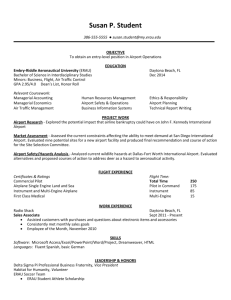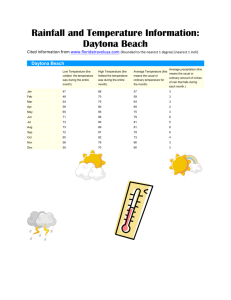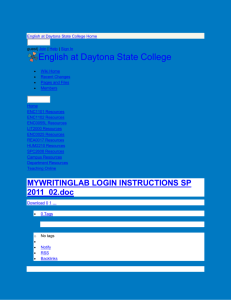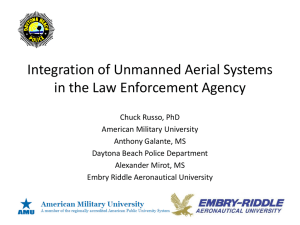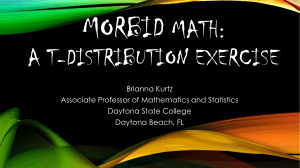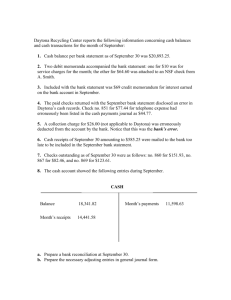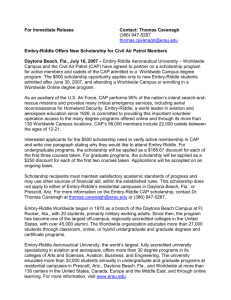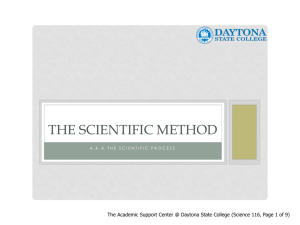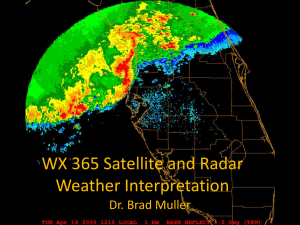Incoming Exchange Student Guidebook - Embry
advertisement
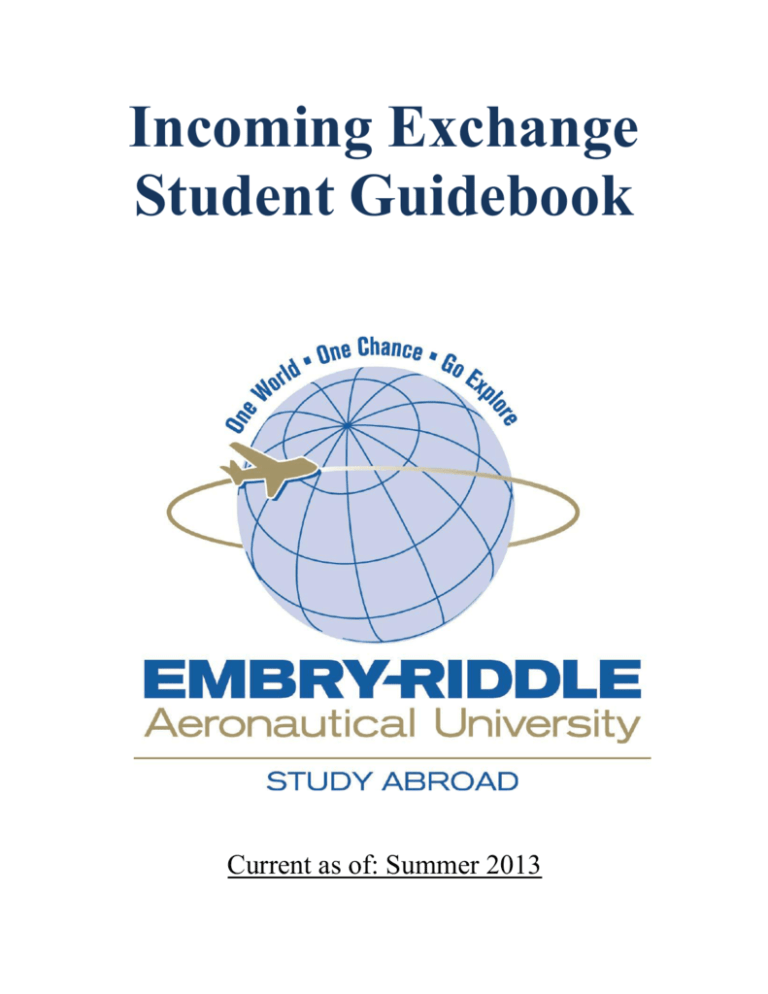
Incoming Exchange Student Guidebook Current as of: Summer 2013 Contents 1. Introduction ............................................................................................................................................. 1 2. First Tasks – Getting here ........................................................................................................................ 2 2.1. How do you get to Daytona Beach? .............................................................................................. 2 2.2. Where can you stay the first days?................................................................................................ 2 3. Living in Daytona ..................................................................................................................................... 4 3.1. Off- or On-Campus ......................................................................................................................... 4 3.2. Shopping for furniture and apartment needs ............................................................................... 7 3.3. Supermarkets and shops ............................................................................................................... 7 3.4. Nightlife – Clubs, Bars and Restaurants ......................................................................................... 7 3.5. Weather ......................................................................................................................................... 8 4. Transportation ......................................................................................................................................... 9 4.1. Cars ................................................................................................................................................ 9 4.2. Motorcycles ................................................................................................................................. 11 4.3. Bicycles......................................................................................................................................... 11 4.4. Public Transportation................................................................................................................... 11 4.5. Taxis ............................................................................................................................................. 11 4.6. DOTS Airport – Daytona Shuttle .................................................................................................. 12 4.7. Other possibilities ........................................................................................................................ 12 5. ERAU Basics ........................................................................................................................................... 12 5.1. Selecting Classes and Professors ................................................................................................. 12 5.2. Registering for Courses ................................................................................................................ 12 5.3. Course allowances and pre-requisites ......................................................................................... 13 5.4. Textbooks and the Bookstore ...................................................................................................... 13 5.5. ERNIE, Blackboard, F- and S-drive, EAGLE-Card .......................................................................... 14 5.6. Mail Service .................................................................................................................................. 15 5.7. Health Services............................................................................................................................. 15 5.8. Insurance...................................................................................................................................... 15 5.9. Food on Campus .......................................................................................................................... 16 5.10. Parking Lots ......................................................................................................................... 16 5.11. AVION Newspaper .............................................................................................................. 16 6. Money affairs......................................................................................................................................... 17 6.1. Opening a Bank Account .............................................................................................................. 17 6.2. Working on Campus ..................................................................................................................... 17 7. Travel, Fun and Activities ...................................................................................................................... 18 7.1. Campus Activities ......................................................................................................................... 18 7.2. Traveling outside of Daytona Beach ............................................................................................ 18 7.3. Important Information for International Travel .......................................................................... 19 8. Communication ..................................................................................................................................... 19 8.1. Cell phone .................................................................................................................................... 19 1. Introduction Welcome and congratulations on your admission to Embry-Riddle Aeronautical University! Here at the Study Abroad Office we look forward to meeting and helping you throughout your stay which we trust will be a great and fulfilling one. Studying abroad is truly an unforgettable life experience, and the ERAU Study Abroad Office is very excited that you have chosen to take advantage of this opportunity to further your studies and expose yourself to another culture at our university in Daytona Beach, Florida. For more information about our school, we recommend that you visit our website at www.erau.edu. The guidebook below offers a practical perspective on several key aspects of your stay here with us. Please read it carefully, explore all of the information and links provided, and use it to help yourself make decisions, plan better, and prepare yourself for your time abroad. If you have any questions prior to your arrival or need information and/or help with your preparations, please don’t hesitate to contact us. Our information is as follows: Study Abroad Staff 600 S. Clyde Morris Blvd Room SCA 263 Daytona Beach, FL 32114 Ph: 386 226 6215 Fax: 386 226 7070 E-mail: dbstudy@erau.edu Also find us on Pinterest, Facebook, and even Skype at: Eagles Abroad If you are unable to reach us and you have an emergency, you may contact: Associate Vice President of Academics Ph: 386 226 6634 E-mail: oxleyr@erau.edu Once again, welcome to ERAU. We truly look forward to helping you through these next few months in your new “home away from home” and helping ensure that your experience is a positive one not only academically and professionally, but personally as well. Sincerely, The Study Abroad Team Embry-Riddle Aeronautical University 1|Page 2. First Tasks – Getting here 2.1. How do you get to Daytona Beach? There are basically two different ways to get into Daytona: fly directly to the Daytona Beach International Airport or fly into any other airport nearby and take ground transportation to Daytona. The easiest and most comfortable way is to fly directly into Daytona International Airport (DAB). This might be the best choice since the airport is located within the city and very close to Embry-Riddle. (ERAU is attached to the airport and uses it for flight training.) The other way would be to fly into an airport nearby and travel to Daytona either by bus, rental car, taxi, or other means. Some major airports in the vicinity are Orlando International Airport (MCO, 70 miles, 1hour 15 min by car), Sanford (SFB, 40 miles, 47 minutes by car), Jacksonville International Airport (JAX, 110 miles, 1 hour 45 min by car), Tampa International Airport (TPA, 145 miles, 2 hours 30 minutes by car) or Miami International Airport (MIA, 270 miles, 4 hours by car). Transportation options are listed page 9. It may be cheaper to fly into a major airport in the vicinity since some airlines have direct connections abroad and prices may be significantly lower to the relatively small size of the Daytona Beach Airport. However, please take into consideration the additional effort and cost that may be involved in traveling by ground to Daytona from a nearby airport as well as the fatigue you may be experiencing after a long transatlantic flight. Ticket prices change rapidly and sometimes do so for no apparent reason. The best thing you can do in your search for the most inexpensive option is check your local travel agency, online services, and airline homepages while considering your needs and preferences (connection flights, arrival time, ground transportation, etc.) 2.2. Where can you stay the first days? Note: If you decide to stay on-campus and you plan on arriving on or after the check-in date, you can skip this section. If you decide to stay off-campus, we recommend that you do your best to find something before you arrive. If you prefer, come a few days or weeks early to find something prior to the start of classes, however you will need a place to stay until you find something. If you do not know where you can stay, there are only a few options outside of staying in a hotel. In this case, the Suburban Lodge (http://www.choicehotels.com/) may be a good alternative for you. It is near the airport, the shopping mall, and ERAU. The rooms are clean and the rates are one of the cheapest in town ($45 + tax). Since prices always vary check online search engines like www.kayak.com where you can compare several options at once (this is also a great website to shop for airline tickets). Keep in mind that Daytona Beach 2|Page has a strong seasonal tourism industry meaning that on certain dates most decent hotels may be fully booked or may charge outrageous prices. In order to avoid this, book or at least reserve your hotels early. Although we will do our best to find someone to pick you up at the airport (please e-mail us your arrival information at study.abroad@erau.edu if you would like to be considered for airport pickup), we can’t guarantee that this will be the case especially if you arrive anywhere other than Daytona Beach International. If we can’t pick you up at DAB, the best way to get to your hotel is by taxi. You will find further information in the Transportation section of this guide book. (Section 4) 3|Page 3. Living in Daytona 3.1. Off- or On-Campus While at ERAU, you will have the option to either live on-campus, or if you would like to, you may search and secure your own room/apartment off-campus. There are advantages and disadvantages with each option. Listed below are some of the important aspects to consider regarding each option and how they compare which you may use to help make a decision as to which one fits your needs and preferences best. 4|Page 3.1.1. On Campus – The Dorms Dorms on-campus varies in size, amenities, and location. The two main options for exchange students are: O'Connor Hall is located in the Student Village and is designated as mainly for upper-class students. Students assigned to O'Connor Hall share four bedroom apartments (two students share each bedroom), which include two baths and a living/dining room. $2,200 per semester. Stimpson Hall is located the Student Village and is designated as primarily for upper-class students. Stimpson Hall offers efficiency apartments for two students. $2,550 per semester Please visit the Daytona Beach Housing website to find out more about each including costs and layouts at http://daytonabeach.erau.edu/student-life/housing/ Please contact the Housing Department directly with any questions at: Department of Housing: 600 South Clyde Morris Blvd. Daytona Beach, FL 32114-3900 Tel: (386) 323-8000 Fax: (386) 323-8015 E-Mail: dbhousng@erau.edu 5|Page 3.1.2. Off Campus – Finding a room Renting an apartment by yourself may seem difficult for students not familiar with the area. Furthermore, if you want to negotiate your own lease, it may be more difficult to do so being an international student with no credit history in the U.S. Keep in mind too that most contracts could last for more than a year, which could be a problem if you are staying for only one semester. Moreover, utilities like water, gas, electricity, internet and phone services may require either a social security number (can be obtained if you find a job on-campus that justifies the need to have one) or a high deposit. For all these reasons, the most practical solution is to try to find a shared house or apartment with roommates (usually other ERAU students) that have already secured apartments and need roommates to help them pay the rent and bills. A walk through campus and its billboards will be enough to realize that there are plenty such students especially at the beginning of the semester. As mentioned previously, prices vary from place to place but you should be able to find decent housing for around $300 to $600. The best places to find roommate offers and ads are usually the billboards around ERAU (the Mail Room, Lehman Building, and the student center are some of the most popular billboard locations. You may also find a wealth of offers at the Daytona Beach Community College that is located just a few blocks from ERAU on International Speedway. Other sources to find a room are listed below and we recommend that you check them out prior to your arrival. • The Daytona Pennysaver: (http://daytona.classifieds.floridapennysavers.com/class/classifiedads.aspx?scid=Rentals) • The Avion Classifieds: (http://www.avionnewspaper.com/classifieds/) • www.roommates.com • www.craigslist.com • NewsJournal Classifieds (http://www.news-journalonline.com/class/) It is important to contact potential landlords, compare locations and prices, and do your homework. Avoid committing to stay in extremely cheap housing unless you have seen the property and the area. Some areas of Holly Hill and Daytona can be less safe than others. Daytona Beach is generally a safe place to live, but you’ll want to look at your options before you commit. Also, keep in mind that that you will not be very mobile in the first few days especially if you don’t have a car so going around to see many places may not be very practical. Sometimes landlords are very friendly and will sometimes pick you up wherever you are to show you the room they offer. 6|Page When you choose a place to stay and get ready to sign the contract, don’t be surprised if the landlord demands that you pay the first and last month up front. That is a common procedure and the additional rent serves as a security deposit. At the end, you will either not have to pay the last month of rent, or will get the money back after the contract period is over provided no major repairs must be done due to damage that you caused to the property. Very popular places to live for students are apartment complexes like Barrington, Countryside Apartments, Forest Glenn, Forest Lake, Indigo Pines, Misty Springs, Sutton Place, The Harbor, Willow Run, Wood Forest, The Legacy, Andros Isles and others. Please keep in mind that if you decide to stay off-campus, it will be your responsibility to find housing off-campus. The Study Abroad Office may offer limited assistance wherever possible, but may not be able to provide help in transportation to see properties, communications with landlords, or negotiate on behalf of the student. 3.2. Shopping for furniture and apartment needs Although some rooms that are eligible for rent may be fully furnished, more often than not you will need to purchase your own furniture. Fortunately there are many places to do this in Daytona and the surrounding area which you may find online; however at the very least you will require a car in order to move any large items back to your new place of residence. Some stores do offer delivery of furniture to your residence as part of their service which you may consider. Again we do encourage that you thoroughly investigate the details of your rental agreement and furniture accessibility. 3.3. Supermarkets and shops Stores in the USA often open for long hours and sometimes never close. This is truly convenient and something not found in many other places around the World…enjoy it! Grocery stores nearby are Publix on Clyde-Morris and Beville and Wal-Mart on Beville just west of Clyde Morris Blvd (both of these places are pretty close to one another). If you need to purchase special items or want to buy clothes, etc., the Volusia Mall is nearby as well as other small shopping centers. 3.4. Nightlife – Clubs, Bars and Restaurants Although Daytona is not exactly a big city, it does have its fair share of restaurants, pubs, bars, lounges, and night clubs that cater to different tastes in music and overall entertainment. On Tuesday a popular place for ERAU students is to go to La Fiesta, a Mexican restaurant/bar for good Mexican food and other specials (http://www.lafiestaportorange.com/index.php ). Popular bars with live music are Mai Tai Bar (http://www.maitaibar.com/) and The Ocean Deck (http://www.oceandeck.com/). For more craft or international beers, visit one of the local Irish pubs like McKay’s Tavern or Robbie O’Connell’s 7|Page Pub (http://www.robbieoconnellspub.com/). They have up to 100 different kinds of beer, a good wine selection, and excellent atmosphere. Also it is common to see Study Abroad Staff and Students at Mck’s on Thursday nights for their hamburger special, this is an ideal time to ask simple questions as well as to relax and catch up. Please keep in mind that the drinking age is STRICTLY 21 and you are advised to drink responsibly especially if you are driving. One of the most serious problems you can get into in the U.S. is to get caught driving under the influence of alcohol and/or drugs. Such infraction may even be subject to deportation so please take it very seriously. To be on the safe side, we recommend that you DO NOT DRINK AT ALL IF YOU WILL BE DRIVING. If you want a wider selection of night clubs and entertainment, the ideal place to go is Orlando, and although it is about one hour away, it is quite accessible and may be worth the trip every once in a while. However, keep in mind that bars and clubs may close as early as 2 or 3AM in some locations so don’t arrive too late. Finally, the region around Daytona is visited by a lot of tourists. Subsequently there is a very wide selection of restaurants. Most major US franchise restaurants have at least one restaurant in Daytona, and there are many local places to eat as well. 3.5. Weather Embry-Riddle was moved to Daytona Beach a long time ago for many reasons, one of which was undeniably the great weather that locals here enjoy year-round, which is especially good for flying. Although it can get very hot during the summer and some cold fronts may make it a bit cold in the winter, weather is generally mild with a wetter season during the months of June to August or so. However, as you may already be aware, Florida has had and will continue to have, its share of hurricanes and tornados. However hurricanes are announced very early allowing for more time to prepare and evacuate if necessary. Tornados unfortunately are largely spontaneous and have actually caused the most damage to ERAU including a severe tornado on December 25, 2006 that destroyed more than half of all aircraft and several buildings including the main administration building. It is important to follow safety advice that is usually distributed campus wide via phone (if you have a phone line within campus) and e-mail. If there is a real threat ERAU may cancel classes and you will likely be advised to stay at home or leave the region. Check the news at http://www.news-journalonline.com/, ERNIE at http://ernie.erau.edu/ , and your EAGLE mail at https://owa.erau.edu/ for further advice and updates. You will have access to ERNIE and Eagle Mail after you arrive on campus. 8|Page 4. Transportation One of the first things you will realize after your arrival is that public transportation in Daytona Beach isn’t very efficient, and if you want to get anywhere outside of ERAU (go grocery shopping, explore apartments, go out at night), you will need some sort of transportation. If you live on campus and don’t plan on going out much, are on a low budget, and/or have friends that can drive you around, a bicycle will be enough to get around. However, if you would like to get the most out of Daytona Beach, its surrounding areas, and Florida (or beyond), we highly recommend that you to plan to purchase a car. Being the most common (and for most, absolutely indispensable) mean of transportation it is relatively inexpensive and affordable for students. Rising gas prices are still very low compared to European gas prices and taxes and fees are relatively cheap. Furthermore, towards the end of your exchange program, you can resell the car – sometimes even at a profit! – To recoup your initial investment. 4.1. Cars 4.1.1. Driver’s License The driver’s license in the US is also the most common form of ID with which you can, among other things, get special local discounts in bars or discounts in other locations like amusement parks in Orlando. Therefore we recommend you to go to the local Department of Motor Vehicles (DMV) to get your Florida Driver’s License regardless of whether or not you plan on purchasing a car. License costs are usually cheap and depending on what country you are from, you may not even have to take a test at all or may be required to take only a portion of it if you have a driver’s license from your home country. Just go to the following link http://www.hsmv.state.fl.us/ and check the different requirements. If you have to take the test there is material on http://www.dmv.org/fl- florida/english_handbook.pdf that you can read to prepare yourself for the test. Some useful links are: http://www.dmv.org/fl-florida/department-motor-vehicles.php http://www.dmvflorida.org/ http://www.hsmv.state.fl.us/ 9|Page 4.1.2. Buying Used Cars Buying a used car can be either a good experience or a very bad one. Looking for a good deal can be very tricky and we recommend that you ask any potential seller to allow you to have a mechanic take a look at the car. Prices for such a service vary, but you can save a lot of pain and suffering – not to mention money – if you make the small investment. Another piece of advice is not to rush. Finding the right car may take some time and impulse shopping when it comes to cars can prove to be very expensive later on, especially given the fact that repairing vehicles can be extremely expensive and sometimes even more so than the value of the vehicle itself. Good sources to find used cars are the university billboards, the http://www.pennysaverusa.com/cars/,http://www.craigslist.com/,http://www.newsjournalonline.c om/class/,http://www.autotrader.com/ ,http://www.cars.com/ and even on http://www.ebay.com/ which also worked for earlier exchange students. Once you find a good car try to negotiate with the seller. Use the Kelly Blue Book (http://www.kbb.com/) values to compare the actual worth of the car and the money the seller wants to get a good idea of where your potential vehicle’s asking price stands. Before you are allowed to drive your new car you have to do two things assuming you have already a driver’s license. First you have to purchase insurance for your car. There are plenty of insurers out there and all come up with different rates. We recommend you shop around online and/or calling actual companies for quotes. The second thing you must do is register your car and get your license plate. You will need proof of insurance to do this. Such proof can usually be obtained on the same day that you purchase your insurance policy and often it is sent to you by e-mail. If it is your first car registration in Florida, you may have to pay up to 250 dollars. Registrations are usually valid until the month of your birthday upon which time you must renewal for around 30 dollars. Actually, renewal should be done before your birthday month to avoid any late registration fees. After you register, a license plate should be given to you on the spot and an official title will be sent to you by mail. Finally, please drive carefully and make sure you know and follow all applicable driving regulations. 4.1.3. Rental Cars Rental cars are commonly very cheap in the US. You can get a car for around 40 dollar a day. The central rental car return and pick up location in Daytona is the airport. You will find the cheapest cars over there. http://flydaytonafirst.com/rental.htm is a comprehensive website which lists all companies at the airport. One thing to consider is that if you are under the age of 25, most companies will charge you around 25 dollars extra per day, although this varies from company to company. Check the websites of the local rental car dealers for more information. 10 | P a g e 4.2. Motorcycle A motorcycle is a cheap and fast way to get to ERAU and back. One thing you should consider though is that Florida has a tropical climate and chances are that you will get wet sometimes while riding. A couple of advantages however, are that you do not need to pay for insurance to register a motorcycle (though we strongly encourage you to get it anyways), and gas expenses are considerably lower. 4.3. Bicycle While bicycling is considered a main form of transportation in many other cities and countries, this is definitely not the case in Daytona Beach. Subsequently bike ways are rare and car drivers aren’t always too considerate of people riding their bike on the street. Needless to say, be very careful and watch out! On the plus side, bicycling is a healthy, inexpensive way to get around for distances up to five miles or so depending on how fit you are and how courageous you are. You can find new bikes in the local supermarkets like Wal-Mart or Target for around 100 dollars. The quality though is not very good and if you want to buy a better bike you should try Bob’s Bike Shop (http://www.bobsbikespot.com/), Play it again Sports or Sports Authority. Play it again Sports also sells used bikes. Other sources to find used bikes are the local classifieds like the Pennysaver, billboards on campus, or even garage sales. 4.4. Public Transportation Daytona’s public transportation system has a lot of room for improvement, unfortunately. There is a bus service but the schedules and routes are not always very convenient. However, if you want to give it a try check out http://volusia.org/votran/. Make sure you bring a good book to read if you are going somewhere that requires a bus change! 4.5. Taxi There are several taxi services in Daytona Beach. ERAU has a special agreement with one of them. It is called “Saferide”. The main purpose of this service is to encourage students not to drink and drive. After you register yourself at the SGA (Student Government Association) you will get a card which allows you to obtain free taxi service back to your home. The card also allows you to use taxis at reduced rates to go anywhere in the specified region. If you want to use a cab before you are part of the Saferide program, you may call (386) 255-5555 for Yellow Cab. 11 | P a g e 4.6. DOTS Airport – Daytona Shuttle The Daytona Orlando Transit Service at http://www.dots-daytonabeach.com/ provides you bus service between Orlando International Airport and Daytona. It costs around $35 and rides on specific schedules which can be viewed online. There may be other less expensive or even free transit services at the beginning and end of the semesters. Check on http://sga.db.erau.edu for more information. 4.7. Other possibilities Some other possibilities to move around within Florida and the entire US are the famous Amtrak (http://www.amtrak.com/) and Greyhound (http://www.greyhound.com/). Don’t expect the service to be as fast, comfortable, or as cheap as their European or Asian counterparts, however. 5. ERAU Basics 5.1. Selecting Classes and Professors Along with your exchange program admission letter, you should have received a course schedule where you can see all courses offered and professors teaching them during the term you will be arriving. Your admission letter also had pre-registration instructions pointing out the contact information for your academic advisor at ERAU who will help you choose an appropriate schedule of courses. In many cases, you may have a choice between different sections of the same course, often taught by different professors. If all sections are still open and you indeed have a choice, you may want to consult www.ratemyprofessor.com to get a feel for the different professors that will be teaching the course(s). This website is an online forum where students evaluate their professors and virtually all ERAU professors can be found within. Keep in mind that all reviews are subjective and many times dubious at best so don’t rely solely on this website to make your choices. 5.2. Registering for Courses Usually the registration is done online. Unfortunately exchange students cannot register online. If this is your first semester at ERAU, you will need to contact your academic advisor to work out an initial class schedule, as per the instructions in the admission letter. This schedule will depend on the courses that you want to take, the pre-requisites that these may require, and the availability of seats in the desired classes. If you are a continuing exchange student, you will register manually for any remaining semesters by filling out a paper registration form. Please see your advisor for more help with registration issues. Please keep in mind that almost every upper level course at ERAU has prerequisites. Your advisor will work with you to determine if your academic background is sufficient to take the desired 12 | P a g e courses. Due to the added steps that exchange students must take to register and the fact that ERAU students register for the Fall term during the month of March when most exchange students haven’t even been admitted, chances are that some or all sections of several classes will be closed. It still may be possible to enroll in the class through a process called “Forced Entry”. Please discuss this possibility with your advisor if the course you need to take is mandatory for your home institution or if you don’t have any alternative course options. Finally, if you feel the need to change your courses after the term has started, you may do so by filling an “add-drop” form available in the Records and Registration Office. Make sure you are aware of the last date when this is possible – usually about 10 days or so after the semester commences. 5.3. Course allowances and pre-requisites While at ERAU as an exchange student, you will be allowed to take ONE the following combinations of courses. It is strictly prohibited to take any more courses than prescribed below, and any excess costs due to supplemental courses must be paid by the student if he/she wishes to take such added courses: • Up to 16 undergraduate credit hours (4 to 5 courses approximately) • Up to 9 graduate credit hours • 2 undergraduate courses and 2 graduate courses • 3 undergraduate courses and 1 graduate course Please also keep in mind that some courses may have pre-requisites and you may be required to provide background academic information to ensure your ability to take a given course. 5.4. Textbooks and the Bookstore Textbooks are many times an essential part of the course and, expensive as they may be, often mandatory. The campus bookstore will have all books that are required by professors, and if they don’t they can order them for you. This is a convenient way of obtaining your books, although it is far from being the most economical. We suggest that you look at online bookstores and compare prices before you purchase a book at the bookstore. At the end of the semester, if you plan on selling your books, we also suggest that you look into alternatives to simply selling them to the bookstore as you are likely to get considerably more elsewhere. 13 | P a g e 5.5. ERNIE, Blackboard, D- and S-drive, EAGLE-Card Embry-Riddle provides all of its students with very convenient online services, and almost everything can be done online including accessing your account files and documents. Upon arrival, you will get a login and password for all such services. If you are having trouble, need information, or have any questions, you may contact IT-services at 386 226 6990 (or simply extension 6990 from within campus). 5.5.1. ERNIE and Blackboard ERNIE and Blackboard (http://ernie.erau.edu/) provide students with a comprehensive online services and information platform. You will likely use it on a daily basis as it provides, among other things, access to on-campus news and events, organization updates, registration information, course and professor communications, and much more. 5.5.2. ERAU email The university provides you with a free email service which can be accessed via ERNIE at http://ernie.erau.edu/ or directly through https://owa.erau.edu/. Usually your email-address will be yourlogin@erau.edu or yourfirstname.yourlastname@erau.edu. 5.5.3. P-Drive The P-drive is a private storage location provided on the university server for every student. Once you are logged in a lab computer you can directly access your P-drive space via the Windows Explorer tool. From home you can access your files on the P-drive through ERNIE. Usually you will be provided with 200mb of space. 5.5.4. S-Drive Before Blackboard entered service at ERAU the S-drive was the data exchange tool. You can access it the same way as the P-drive but the importance of the S-drive is steadily decreasing. There might be some professors left who are still using the S-drive but the majority is using blackboard only. 5.5.5. EAGLE-Card The Eagle Card is your university identification card. You will get it during orientation and it can be used to open doors to labs; check-out books from the library; pay for food and photocopies; and get discounts outside of school, among other uses. For more information about the Eagle Card, you may visit http://daytonabeach.erau.edu/eaglecard from where you can also deposit funds and manage your card. Aside from being essential within campus, your Eagle Card may be used off campus at many locations. 14 | P a g e Refer to the above website. 5.6. Mail Service While at ERAU, you will have a personal mailbox where you can receive regular mail. You should obtain orientation your key box number during orientation and your address will be For mail sent through the U.S. Post Office YOUR FULL NAME INCLUDING MIDDLE INITIAL 600 South Clyde Morris Blvd. PO BOX 14#### DAYTONA BEACH, FL 32114-3977 Sent by FEDEX, UPS & DHL YOUR FULL NAME INCLUDING MIDDLE INITIAL EMBRY-RIDDLE AERONAUTICAL UNIVERSITY600 SOUTH CLYDE MORRIS BLVD MAIL 14#### DAYTONA BEACH, FL 32114-3977. The mailboxes are located next to the mail room in the Student Center Annex. Even though you might live off-campus, check your mailbox regularly as you may miss important university information or interesting campus activity offers. More information is available at the Mail Service website (http://fusion.erau.edu/db/mailcenter/index.cfm) 5.7. Health Services All registered students have access to general health services (http://daytonabeach.erau.edu/health) as long as they are taking classes. Although services are limited, it may be a good starting point whenever you feel sick or about to get sick as long as it’s not a major emergency in which case you should head straight to a hospital. 5.8. Insurance All students at ERAU, including exchange, visiting, and research students must be insured. By default, students registering for courses will be enrolled in ERAU’s health insurance plan with United Health Care at the current year’s rates. If you plan to be covered through insurance from your home country, you MUST contact the Office of International Student Services so that the terms of your insurance can be reviewed, approved, and ERAU’s insurance can be subsequently waived. You must get a health insurance waiver BEFORE the semester’s add/drop period ends. A typical insurance must cover at least $50,000 in medical fees, have expatriation benefits should you have an emergency and need to fly back home, and have overall comparable or superior coverage to that provided by ERAU’s plan. For information on ERAU’s insurance plan, please visit: https://www.uhcsr.com/SelfServiceSupport/Students/CollegeHome.aspx 15 | P a g e You can enter Embry-Riddle Aeronautical University for the institution and open the appropriate information. 5.9. Food on Campus There are several options on campus when it comes to food. The main food court and restaurants are in the student center. There is also Propellers near the aviation building that serves great fast food such as burgers, fried chicken, wraps, etc. Finally, Student Village you can have an all-you-can-eat buffet for around $8 dollars. To cut down on food costs, you may consider cooking food at home and heating it at ERAU. You are also welcome to try any of the many restaurants that are relatively close to campus. If you prefer to eat almost exclusively on-campus, you may want to consider getting a meal plan http://daytonabeach.erau.edu/student-life/dining/). However, since meal plans offer a fixed amount of meals that you must eat per week (any uneaten meals will be lost) we recommend that you compare costs and consider how much food you think you will need before committing to such a plan. Often it may prove to be much cheaper to deposit Eagle Dollars in your Eagle Card Account and buy only what you want. You may find out that one Blue Plate Special (available only in the Student Center food court) for about $3.50 per day is all you will eat at ERAU especially if you live off-campus. You may also pay in cash, but Eagle Dollars are certainly more convenient as all you need is your card. Keep in mind that any unused Eagle Dollars will be lost when you leave so don’t deposit too much in your account particularly towards the end of your stay at ERAU. 5.10. Parking Lots If you want to park your car at school you have to register at the Parking and Traffic Services and obtain a parking decal that will cost around 35 dollars for a year (minimum duration). Make sure you read the parking guidebook to avoid getting potentially expensive and entirely avoidable tickets. For more information: http://daytonabeach.erau.edu/about/parking/. 5.11. AVION Newspaper The AVION (http://www.avionnewspaper.com/) is the schools newspaper and is written by students of ERAU. For you as a future student it is a good way to inform yourself about things going on at school prior to your arrival. Obviously it can be very useful while you are a student as not only will it keep you current on what is going on at ERAU, but it also has classifieds and other ads that may be of particular interest to you. 16 | P a g e 6. Money affairs 6.1. Opening a Bank Account Opening a bank account is relatively easy and free for students for the first five years. During the orientation local banks will be on campus to promote their special account offers so make sure you try to explore your options. All of them will likely offer you a check-card that is perhaps the most convenient way to pay for pretty much anything off-campus right along regular credit cards. However, be careful because using your check-card when you don’t have enough funds in your account can be very expensive with overdraft fees as high as $35. There are two ATMs on campus one that is located next to the SGA Office and is run by Wells Fargo. The other is in the Student Village and is run by Bank of America. Unless your account is with either of them, you may incur additional fees if you use another bank’s check-card to withdraw money. Before leaving your home country, find out how to best transfer your money from your bank account to the United States and eventually your local bank account. Some major banks from your home country and in the US may have agreements that allow you to withdraw money from your home bank account without charging you any fees. 6.2. Working on Campus As a registered student you are permitted to work on campus. You will only be permitted to work up to 20 hours per week. You will also require a social security number. To get one, you must first find a job, obtain a contract from your employer that you are to show Eileen Hamme at the International Student Services Office. You will then be given the necessary paperwork that will allow you to request a social security card at the Social Security Office. The contact information for the Daytona branch is: 991 3rd St, Holly Hill Phone: (386) 255-7543 For more information about the social security card, please visit the official website http://ssa.gov/. 17 | P a g e 7. Travel, Fun and Activities 7.1. Campus Activities Once school starts you will have the opportunity to participate in plenty of campus activities (http://daytonabeach.erau.edu/student-life/clubs/) and join a long list of clubs. We believe that participating in such clubs and organizations is potentially one of the best things you can do while at ERAU as they will provide you the opportunity to meet students with similar interests, backgrounds, etc. If practicing English is among your objectives during your exchange program, such activities will inevitably force you to do so while getting the most out of your social, professional, and even academic experience abroad. To learn more about clubs and organizations, you may visit the link above or wait until you get here and explore what each has to offer during the Student Activities Fair that takes place around the second or third week of every semester. Intramural sports (http://daytonabeach.erau.edu/student-life/sports-facilities/) provide yet another excellent way to meet new people and even stay fit! There are a wealth of sports, each with different timetables and levels of competitiveness so look into what you would be interested in from the start of the semester so that you don’t miss out on any that you would have like to participate in. If you want to plan your own activities and/or events, keep in mind that ERAU has several kinds of equipment that it can rent out to you for free. Examples of these items are coolers, tents, rackets, soccer balls, etc. Finally, if you would like to join an actual ERAU sports team, you are welcome to participate in their tryouts that usually commence towards the beginning of the season. For more information, visit the ERAU Athletics website at http://daytona.embryriddlesports.com/. 7.2. Traveling outside of Daytona Beach Although academics should be your main objective, your study abroad experience should not be limited the classroom – far from it! Aside from participating in clubs, activities, and going out in Daytona and its surrounding areas, there is a wealth of places to visit and travel to within Florida and, of course, the U.S. as a whole. You will need a car for pretty much any trip you want to make so if you don’t have one, you will probably have to either find a friend that does or rent one. Florida itself provides plenty of places to visit during the semester. Good places to visit nearby during a weekend or just for a day are the theme parks in Orlando such as Disney World or Universal Studios, St. Augustine, Kennedy Space Center, and Juniper Springs Canoe Trail. There are also some nice nearby beaches like Ponce Inlet and even the Florida west coast with its beautiful beaches is only a two- hour ride away. Bush Gardens in Tampa is a popular destination, too. 18 | P a g e We also encourage you to visit Miami, the Everglades, Naples and the Florida Keys. Finally, there are cheap cruises to the Bahamas that may interest you. A great overall resource to plan your trips in Florida is http://www.visitflorida.com/. If you want to visit places further apart use travel sites like www.sidestep.com or www.kayak.com to compare airfares. Also visit the sites of the low cost carriers like Jet blue at http://www.jetblue.com/ and Southwest at http://www.southwest.com/ directly since they are often not listed in the travel search engines. 7.3. Important Information for International Travel If you want to travel outside the US do not forget to have your DS-2019 signed. This is very crucial! Without that signature you might have complications when you re-enter the U.S. You can get the signature at Eileen Hemme’s office in the International Student Services Office. 8. Communication 8.1. Cell phone From past experience with past exchange students, we have come to realize the importance of staying connected outside of the home where you will likely not be too often. We therefore recommend that you consider using a cell phone. The two options available to you (each option is available with all major cell phone service companies) are to sign a contract or use a pre-paid cell phone. If you are here for a semester and not planning on using your phone too often, a prepaid cell phone may be the most economical option. Calling hourly rates are about 10 cents per minute and unless you bring your own unlocked cell phone that works in the U.S., you will have to purchase one here from one of the many cell phone companies available. If you bring your own phone, you will have to purchase a SIM card that you can do at any cell phone store. If you stay for a whole year and/or your plan on making a lot of phone calls, you may want to think about getting a contract. Prices vary from provider to provider so you should compare all different offers to find the cheapest deal for you. Make sure you compare all added benefits too like free mobile to mobile minutes, free nights and weekends, etc. If you don’t have a social security number, you may have to pay a very expensive deposit to get into a contract. Furthermore, make sure what the conditions are for terminating your contract if you leave the country prior to the 1 or 2 year minimum term. The Volusia Mall has almost every cell phone service provider so that would be an ideal place to shop around and find the option that best fits your needs. 19 | P a g e
